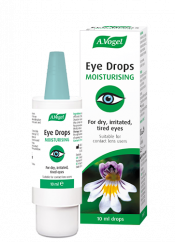An introduction to dry eyes
Dry eyes occur when there are not enough tears to moisten, lubricate and protect your eyes. Your tear glands constantly produce small amounts of tears and when you blink, these are ‘spread’ over the surface of your eyeball.
For healthy eyes, a layer of tears should always cover your eyes, although you probably won’t notice this until the tears spill out of your eye when you laugh or cry.
If you are suffering from dry eyes, even by blinking frequently you will be unable to create enough tears to moisten your eyes.
Types of dry eye
Tear deficient dry eyes is when your eye is unable to produce enough tears. This means that the layer of tears over the eye breaks up, leaving patches on the surface of the eye which are not covered.
Evaporative dry eyes is when a sufficient amount of tears is created, but what is produced evaporates quickly, so the surface of the eye cannot be kept moist.
What are the causes of dry eyes?
There are many causes of dry eyes, from biological factors, to environmental factors and even diet.
Tear deficient dry eyes is commonly associated with age, because tear production tends to slow down as we get older. This is particularly true of menopausal and postmenopausal women, because a drop in oestrogen during this time can affect mucus production, leading to dry eyes.
Evaporative dry eyes can be caused by:
Spending too much time focusing on up-close objects such as a computer screen. The reason for this is that the number of times you blink decreases when an object is close, reducing the flow of tears covering the eyes.
Air conditioning or heating. This air is typically drier than natural air, which causes the eyes to dry out more quickly.
Weather. Cold, windy weather can also dry out the eyes in the same way to you may find it drying out your skin.
For these reasons, many people find that their eyes feel drier during the winter. This is the cumulative effect of cold weather and spending more time indoors with the heating on, often in front of a TV or computer screen for longer than you might in the summer.
Vitamin deficiencies, such as a Vitamin A or Vitamin D deficiencies can also cause tear evaporative dry eyes.
What are the symptoms of dry eyes?
In general, people with dry eyes describe their condition simply as dry eyes. However, there might be other associated symptoms such as:
- Red, swollen or painful eyes
- Itching on or around the eyes
- Light sensitivity
- Contact lens discomfort
- Sandy or gritty feeling eyes
- Blurry vision
- Eyelids sticking together, particularly when you wake up.
Strangely enough, one symptom of dry eyes is actually watery eyes. This is because as the eyes become dry your tear ducts can over-produce tears in an attempt to replace lost moisture.
Dry eye relief
Certain measures can be taken to relieve the discomfort brought about by dry eyes.
You should try to limit your exposure to factors which aggravate the symptoms. For example, avoid air conditioning or reduce the time you spend using a computer.
When sitting at a computer, some people find it useful to put a post-it note next to their screen simply reminding them to blink, as this keeps the eyes moist.
If you wear contact lenses, make sure to follow the proper cleaning procedure given by your optician. Try to take your contacts out before your eyes get dry: by this I mean that if you are working all day, and know that you are also going out in the evening, try to take your contact lenses out for an hour or so in between to give your eyes a rest, and most importantly, to clean and refresh your contact lenses.
A.Vogel Self-Care Tip: Help for Consistently Dry Eyes
Have a watch of my self-care tip for consistently dry eyes:
Are there any remedies or treatments to help?
Most people suffering from dry eyes find relief by using eye drops containing lubricants.
A.Vogel Eye Drops contain Euphrasia, a plant also known as Eyebright because of its history treating eye problems that dates back to the 14th Century. These drops are great for dry, tired and irritated eyes, and the specially designed bottle keeps the drops sterile without the need for preservatives. Most importantly for contact lens wearers, these drops can be used while wearing your lenses.
When should I go to the doctor with dry eyes?
Most people suffering from dry eyes find that their symptoms come and go without the need of any medical attention. However, there are certain circumstances when it will be advisable to visit a doctor if:
- Your dry eyes are unexplained or if you are worried about your condition
- You find that your vision is affected
- You think that your dry eyes may be the result of another medical condition.








